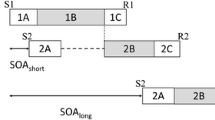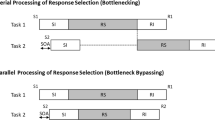Abstract
Practice can dramatically reduce dual-task interference, but typically does not eliminate interference entirely. Residual interference after practice is especially large with certain non-preferred modality pairings (e.g., auditory–manual and visual–vocal). Does this residual interference imply the existence of a persistent central-processing bottleneck? To address this question, we transferred participants with previous dual-task practice to a psychological refractory period design. Although we observed residual dual-task costs in all four experiments, there was no evidence for a bottleneck, even with non-preferred modality pairings. We conclude that practice can eliminate the bottleneck limitation, but performance is still subject to other sources of interference, such as competition between central codes of the two tasks.







Similar content being viewed by others
Notes
If central stages shrink to negligible durations and are handled first-come, first-serve, with negligible switch costs, then a bottleneck limitation would produce no detectable interference between tasks. Such a model, however could never be ruled out and therefore has little scientific value. Moreover, the usual conception of a programmable central resource or a supervisory process does not naturally predict very short central stage durations. These short central stage durations are especially implausible when, as in Experiments 3 and 4, the mean RT is over 400 ms on an average (and over 500 ms on a substantial proportion of trials)
References
Byrne, M.D., & Anderson, J.R. (2001). Serial modules in parallel: The psychological refractory period and perfect time sharing. Psychological Review, 108, 847–869.
Hazeltine, E., Teague, D., & Ivry, R.B. (2002). Simultaneous dual-task performance reveals parallel response selection after practice. Journal of Experimental Psychology: Human Perception and Performance, 28(3), 527–545.
Hazeltine, E., Ruthuff, E., & Remington, R.W. (2005). The role of input and output modality pairings in dual-task performance: Evidence for content-dependent central interference. (in press).
Hazeltine, E., & Ruthuff, E. (2005). Modality-pairing effects and the response selection bottleneck. Psychological Research (in press).
Hommel, B. (1998). Automatic stimulus-response translation in dual-task performance. Journal of Experimental Psychology: Human Perception and Performance, 24, 1368–1384.
Hommel, B., Müsseler, J., Aschersleben, G., & Prinz, W. (2001). The theory of event coding (TEC): A framework for perception and action planning. Behavioral and Brain Sciences, 24, 849–937.
Levy, J., & Pashler, H. (2001). Is dual-task slowing instruction dependent? Journal of Experimental Psychology: Human Perception and Performance, 27, 862–869.
Lien, M.-C., & Proctor, R.W. (2002). Stimulus-response compatibility and psychological refractory period effects: Implications for response selection. Psychonomic Bulletin & Review, 9(2), 212–238.
Lien, M.-C., McCann, R.S., Ruthruff, E., & Proctor, R.W. (2005). Dual-task performance with ideomotor-compatible tasks: Is the central processing bottleneck intact, bypassed, or shifted in locus? Journal of Experimental Psychology: Human Perception and Performance, 31, 122–144.
Logan, G.D. (1988). Toward an instance theory of automatization. Psychological Review, 95, 492–527.
Logan, G.D., & Schulkind, M.D. (2000). Parallel memory retrieval in dual-task-situations: I. Semantic memory. Journal of Experimental Psychology: Human Perception and Performance, 26, 1072–1090.
Meyer, D.E., & Kieras, D.E. (1997a). A computational theory of executive cognitive processes and multiple-task performance: Part 1. Basic mechanisms. Psychological Review, 104, 3–65.
Meyer, D.E., & Kieras, D.E. (1997b). A computational theory of executive cognitive processes and multiple-task performance: Part 2. Accounts of psychological refractory phenomena. Psychological Review, 104, 749–791.
Pashler, H., & Johnston, J.C. (1989). Chronometric evidence for central postponement in temporally overlapping tasks. Quarterly Journal of Experimental Psychology, 41A, 19–45.
Pashler, H., & Johnston, J. C. (1998). Attentional limitations in dual-task performance. In H. Pashler (Ed.), Attention (pp. 155–189). Hove, UK: Psychology Press.
Ruthruff, E., Johnston, J. C., & Van Selst, M. (2001). Why practice reduces dual-task interference. Journal of Experimental Psychology: Human Perception and Performance, 27, 3–21.
Ruthruff, E., Pashler, H., & Klaassen, A. (2001). Processing bottlenecks in dual-task performance: Structural limitation or strategic postponement? Psychonomic Bulletin & Review, 8, 73–80.
Ruthruff, E., Johnston, J. C., Van Selst, M., Whitsell, S., & Remington, R. W. (2003). Vanishing dual-task interference after practice: Has the bottleneck been eliminated or is it merely latent? Journal of Experimental Psychology: Human Perception and Performance, 29, 280–289.
Ruthruff, E., Pashler, H., & Hazeltine, E. (2003). Dual-task interference with equal task emphasis: Graded capacity sharing or central postponement? Perception & Psychophysics, 65, 801–816.
Ruthruff, E., Van Selst, M., Johnston, J.C., & Remington, R.W. (2005). How does practice reduce dual-task interference: Stage-shortening, automatization, or integration? Psychological Research (in press).
Schumacher, E. H., Seymour, T. L., Glass, J. M., Kieras, D. E., & Meyer, D. E. (2001). Virtually perfect time sharing in dual-task performance: Uncorking the central attentional bottleneck. Psychological Science, 12, 101–108.
Shaffer, L. H. (1975). Multiple attention in continuous verbal tasks. In P. M. A. Rabbitt & S. Dornic (Eds.), Attention and Performance V (pp. 157–167). San Diego, CA: Academic Press.
Tombu, M., & Jolicoeur, P. (2002). All-or-none bottleneck versus capacity sharing accounts of the psychological refractory period phenomenon. Psychological Research, 66, 274–286.
Tombu, M., & Jolicoeur, P. (2003). A central capacity sharing model of dual-task performance. Journal of Experimental Psychology: Human Perception and Performance, 29, 3–18.
Tombu, M., & Jolicoeur, P. (2004). Virtually no evidence for virtually perfect time-sharing. Journal of Experimental Psychology: Human Perception and Performance, 30, 795–810.
Van Selst, M., Ruthruff, E., & Johnston, J. C. (1999). Can practice eliminate the psychological refractory period effect? Journal of Experimental Psychology: Human Perception and Performance, 25, 1268–1283.
Welford, A.T. (1952). The "psychological refractory period" and the timing of high-speed performance – A review and a theory. British Journal of Psychology, 434, 2–19.
Wickens, C.D., Sandry, D.L., & Vidulich, M. (1983). Compatibility and resource competition between modalities of input, central processing and output. Human Factors, 25, 227–248.
Acknowledgments
This work was funded by the Airspace Operations Systems Project of NASA’s Airspace Systems Program. The authors thank Mei-Ching Lien and James Johnston for their useful comments on earlier drafts of the paper.
Author information
Authors and Affiliations
Corresponding author
Rights and permissions
About this article
Cite this article
Ruthruff, E., Hazeltine, E. & Remington, R.W. What causes residual dual-task interference after practice?. Psychological Research 70, 494–503 (2006). https://doi.org/10.1007/s00426-005-0012-8
Received:
Accepted:
Published:
Issue Date:
DOI: https://doi.org/10.1007/s00426-005-0012-8




